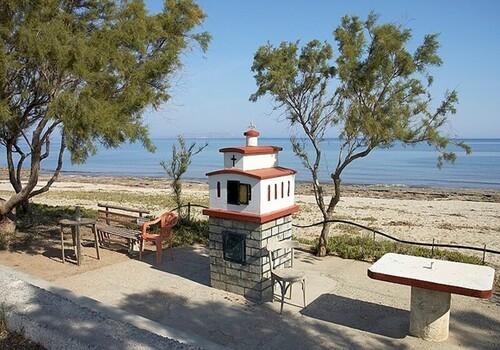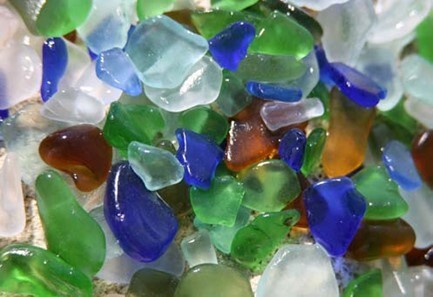Notes from the Wayside - August 2024

Wayside shrine on the Beach in Anissaras, the Island of Crete, Greece
If you were to ask anyone who knows me even remotely well what my favorite thing is, they would undoubtedly say: the beach. There is nowhere I feel more spiritually at home than at the beach, and I admit that I love the sun, sand, and sea with a near fanatical zeal. My husband and children can attest that anytime we have a few hours to spare, Mommy will inevitably be dragging them all to a beach.
More specifically, I love beachcombing, the practice of intentionally walking the beach in search of beautiful or interesting objects. I have an expansive collection of shells from Florida beaches, agates and quartz from the banks of the Columbia River, antique medicine bottles found buried in the mud of the Hood Canal, as well as old fishing weights, driftwood, egg cases, fossils, coins, earrings; any and every curio that nature or man has left behind on the shores of the sea, I will slip into my pocket and save like a precious treasure.
One of my most favorite beach finds is “sea glass”, glass that has been tossed and tumbled by the ocean waves for many years until it takes on a smooth, frosted appearance:
More specifically, I love beachcombing, the practice of intentionally walking the beach in search of beautiful or interesting objects. I have an expansive collection of shells from Florida beaches, agates and quartz from the banks of the Columbia River, antique medicine bottles found buried in the mud of the Hood Canal, as well as old fishing weights, driftwood, egg cases, fossils, coins, earrings; any and every curio that nature or man has left behind on the shores of the sea, I will slip into my pocket and save like a precious treasure.
One of my most favorite beach finds is “sea glass”, glass that has been tossed and tumbled by the ocean waves for many years until it takes on a smooth, frosted appearance:

I have bins and bins full of these enchanting little gems, and every few weeks our family ventures out to our beach house in Sequim, Washington, just so I can get my sea glass hunting “fix”.
Though I and many beachcombers regard sea glass as treasure, it is, in actual fact, trash; trash left behind after decades of using the ocean as a garbage dump and a holding container for industrial waste. Sea glass, really, is just litter, litter that happens to be shiny and nice to look at.
This paradox is perhaps the reason why I love sea glass so dearly. Because sea glass reveals how Nature, in its great wisdom, has taken something ugly that humanity has done and created out of it something beautiful. The ugly thing—our pollution and exploitation of Nature—does not get the last word; beauty does.
To my understanding, this is very much how God works in the world, a world that we so often fill with ugliness and calamity. Like the ocean waves refining fragments of glass, God is really good at smoothing the sharp, jagged edges of mankind’s iniquities so that something new and unexpected can emerge: “He hath made everything beautiful in its time. He hath also set eternity in the human heart; yet no one can fathom what God has done from beginning to end” (Ecclesiastes 3:11).
Certainly, none of us can truly fathom how God took the worst ugliness humanity could throw at Him, the Crucifixion of Jesus, and transformed it into the bridge that invited us all into eternal life, such that we would not despise that day but would actually call it “Good”. Life and hope out of death and despair; even the Crucifixion revealed beauty in its time. It is no surprise, then, that God could turn our shards of broken and discarded glass into sparkling little jewels.
When I walk the beach with my children, we often talk about using our “Sea Glass Eyes”, our term for a way of seeing that takes in all elements of the seaside landscape—the rocks and pebbles, crab shells, sand and seaweed—and is able to decipher among them a shimmering piece of cobalt blue glass, or a nugget of emerald green. Our Sea Glass Eyes enable us to take in the full reality of the shoreline while also discerning that which is most worth noticing, the rounded tidbits of color and light that we seek. On the beach, we are looking for beauty among the flotsam and jetsam, and because we know how to look for it, we find it.
One of my greatest hopes as a mother is to instill in my little ones the capacity to observe this whole disordered world with Sea Glass Eyes; eyes that do not become fixed on calamity but instead are trained to look more deeply, because they know that God is at work somewhere creating beauty and goodness out of the mess. When disaster strikes in my children’s lives, as it has done before and will do again, I pray that they will remember to put on their Sea Glass Eyes, and search among the suffering for where God has left them a treasure.
Though I and many beachcombers regard sea glass as treasure, it is, in actual fact, trash; trash left behind after decades of using the ocean as a garbage dump and a holding container for industrial waste. Sea glass, really, is just litter, litter that happens to be shiny and nice to look at.
This paradox is perhaps the reason why I love sea glass so dearly. Because sea glass reveals how Nature, in its great wisdom, has taken something ugly that humanity has done and created out of it something beautiful. The ugly thing—our pollution and exploitation of Nature—does not get the last word; beauty does.
To my understanding, this is very much how God works in the world, a world that we so often fill with ugliness and calamity. Like the ocean waves refining fragments of glass, God is really good at smoothing the sharp, jagged edges of mankind’s iniquities so that something new and unexpected can emerge: “He hath made everything beautiful in its time. He hath also set eternity in the human heart; yet no one can fathom what God has done from beginning to end” (Ecclesiastes 3:11).
Certainly, none of us can truly fathom how God took the worst ugliness humanity could throw at Him, the Crucifixion of Jesus, and transformed it into the bridge that invited us all into eternal life, such that we would not despise that day but would actually call it “Good”. Life and hope out of death and despair; even the Crucifixion revealed beauty in its time. It is no surprise, then, that God could turn our shards of broken and discarded glass into sparkling little jewels.
When I walk the beach with my children, we often talk about using our “Sea Glass Eyes”, our term for a way of seeing that takes in all elements of the seaside landscape—the rocks and pebbles, crab shells, sand and seaweed—and is able to decipher among them a shimmering piece of cobalt blue glass, or a nugget of emerald green. Our Sea Glass Eyes enable us to take in the full reality of the shoreline while also discerning that which is most worth noticing, the rounded tidbits of color and light that we seek. On the beach, we are looking for beauty among the flotsam and jetsam, and because we know how to look for it, we find it.
One of my greatest hopes as a mother is to instill in my little ones the capacity to observe this whole disordered world with Sea Glass Eyes; eyes that do not become fixed on calamity but instead are trained to look more deeply, because they know that God is at work somewhere creating beauty and goodness out of the mess. When disaster strikes in my children’s lives, as it has done before and will do again, I pray that they will remember to put on their Sea Glass Eyes, and search among the suffering for where God has left them a treasure.
Recent
Categories
Tags
Archive
2026
2025
January
March
June
October
2024
January
March
September
October
2023
March
November
2022
2021
2020

2 Comments
Thanks Tara. Such good insights!!
A beautiful way of explaining how God can and does bring good out of evil, why we should always look for that "silver lining" -- not in a Pollyanna-ish way, but by trying to see beyond the merely obvious. A form of discernment, I guess. Very nicely done!